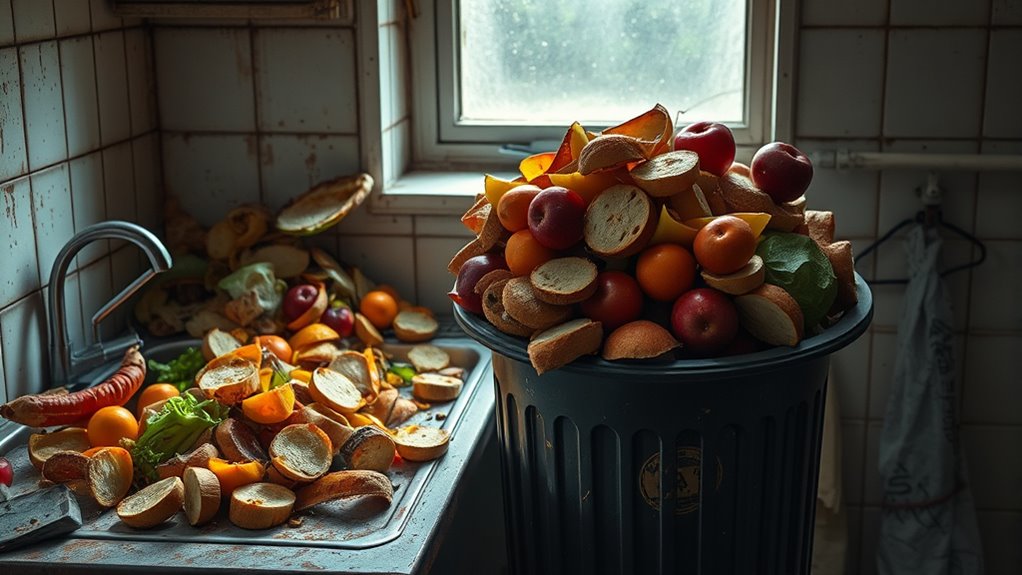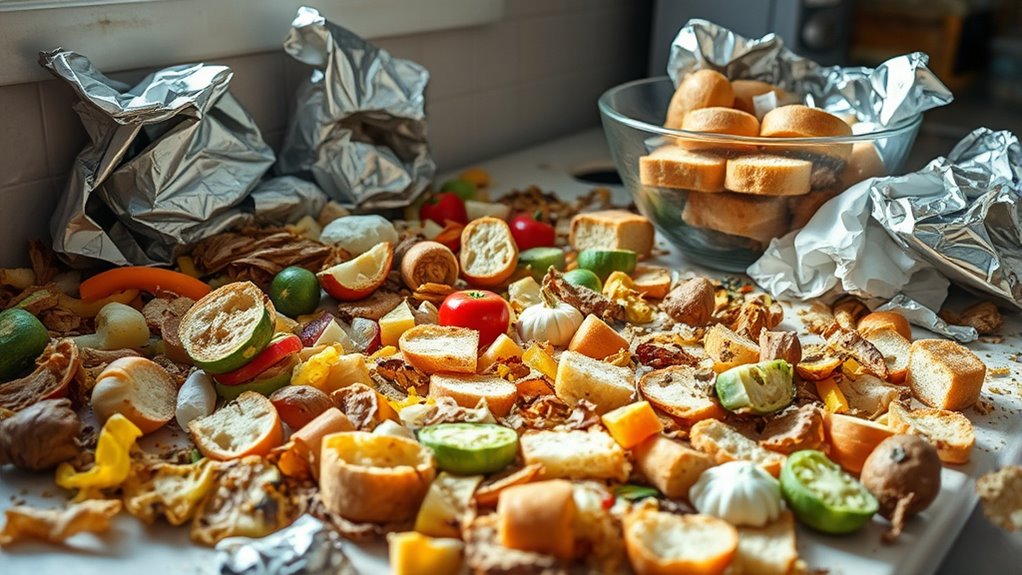Did you know that food waste contributes markedly to climate change by producing methane in landfills and wasting resources like water and energy? By planning your meals, buying only what you need, and composting leftovers, you can make a big impact. Small changes in how you shop and dispose of food not only save money but help protect the environment. Keep exploring to discover simple ways you can reduce waste and live more sustainably.
Key Takeaways
- Globally, one-third of all food produced is wasted, contributing to environmental harm and resource loss.
- Food waste in landfills produces methane, a potent greenhouse gas that accelerates climate change.
- Proper meal planning and portion control can significantly reduce personal food waste and save money.
- Composting food scraps transforms waste into nutrient-rich soil, reducing landfill waste and greenhouse gases.
- Wasting food wastes the resources used in production, transportation, and storage, emphasizing the need for mindful consumption.

Have you ever wondered what happens to all the food we throw away? Every discarded piece of produce, bread, or leftovers adds up, contributing to a massive global waste problem. But there are simple steps you can take to reduce this waste and make a real difference. One of the most effective ways is to start with meal planning. When you plan your meals in advance, you can buy only what you need, preventing impulse buys or over-purchasing that often lead to spoiled food. Take stock of what’s in your fridge and pantry, and create a shopping list based on your weekly menu. This way, you minimize the chances of ending up with ingredients that go bad before you use them. Meal planning also helps you to portion your meals more accurately, reducing leftovers that might sit untouched and eventually be thrown out.
In addition to meal planning, incorporating composting techniques into your routine can considerably cut down on food waste. Composting turns food scraps and yard waste into nutrient-rich soil, closing the loop on waste and giving back to your garden or plants. You don’t need a large backyard to compost; many apartment-friendly compost bins are available that fit on a balcony or in a small space. You can compost fruit and vegetable peels, coffee grounds, eggshells, and even some paper products. Composting is a practical way to dispose of food waste responsibly, preventing it from ending up in landfills where it produces methane—a potent greenhouse gas. It also encourages you to be more mindful of your food consumption habits.
Getting started with composting is easier than you might think. First, choose a suitable container, and find a spot in your yard or balcony. Layer your food scraps with yard waste or dry materials like leaves or shredded newspaper to balance carbon and nitrogen. Remember to turn your compost regularly to aerate it, which speeds up decomposition. Keep it moist but not overly wet, and you’ll soon have rich compost to use in your garden. Additionally, using keto-friendly ingredients in your cooking can help you reduce food waste by making the most of nutrient-dense, long-lasting foods. Combining effective meal planning with composting techniques not only reduces the amount of food that gets thrown away but also helps you become more conscious of your food choices and waste habits. It’s a simple, impactful way to fight food waste, save money, and contribute to a healthier planet—all without much effort. Start small, stay consistent, and watch how your habits change for the better.
Frequently Asked Questions
How Does Food Waste Impact Global Hunger?
Food waste worsens global hunger by wasting resources that could feed those in need. When you support food redistribution efforts, you help redirect surplus food to hungry populations. Improving agricultural efficiency means producing more with less, reducing waste at each stage. By reducing your own food waste, you contribute to a more sustainable system, ensuring surplus food reaches those who need it most and easing the strain on global food supplies.
What Are Common Household Food Waste Mistakes?
You might think wasting food is unavoidable, but simple mistakes like poor storage techniques often lead to spoilage. By improving your meal planning, you can buy only what you need, reducing waste. Proper storage techniques keep your food fresh longer, preventing unnecessary disposal. Avoid tossing leftovers prematurely and learn how to organize your fridge. Small changes like these make a big difference in cutting household food waste and saving money.
Can Food Waste Reduction Save Me Money?
Yes, reducing food waste can save you money. By practicing smart meal planning, you buy only what you need, avoiding impulse grocery shopping. Properly storing leftovers and using ingredients before they spoil also cuts costs. When you minimize waste, you spend less on extra groceries and throw away less food, saving you money over time. It’s a simple way to improve your budget while helping the environment.
How Do Cultural Practices Influence Food Waste?
Cultural practices substantially influence food waste through traditions and dining etiquette. You might find that certain customs encourage large portions or leftovers, leading to more waste, while others emphasize mindful eating and sharing. By understanding and respecting these cultural differences, you can adopt more sustainable habits, like reducing portions or promoting clean plating. Embracing mindful dining within your cultural context helps cut waste and supports global efforts to reduce food loss.
What Policies Are Governments Implementing to Reduce Waste?
Government policies play a crucial role in reducing food waste. They often promote food recovery programs, encouraging businesses and individuals to donate surplus food instead of discarding it. You can support these policies by staying informed and participating in local initiatives. These efforts help minimize waste, save resources, and feed those in need. Ultimately, government actions shape a more sustainable food system, benefiting everyone and reducing environmental impact.
Conclusion
Think of your plate as a garden, and every bite as a seed. When you waste food, you’re tossing away the potential for growth and nourishment, both for your body and the planet. By changing your habits, you become the gardener of a more sustainable world. Remember, small acts like finishing your meal or composting can turn your everyday choices into seeds of change—growing a future where nothing goes to waste.










